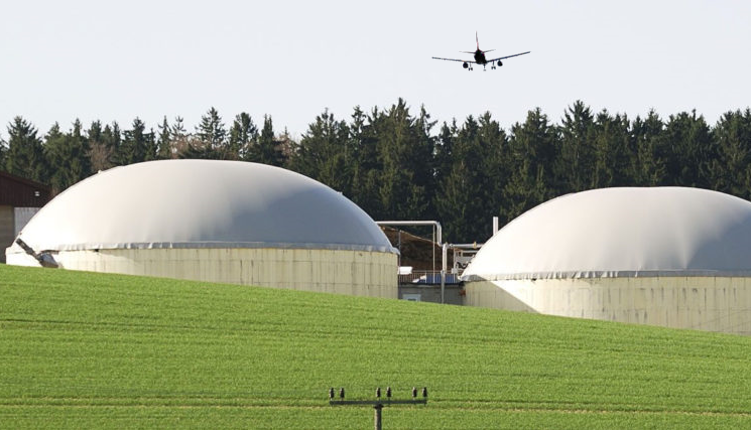Published on March 31, 2022
Partnership between German Cooperation Agency and CIBiogás leads to investments of about R$ 9 million in Paraná
In order to reduce greenhouse gas emissions by the airport sector, another innovative initiative for the production of renewable fuels was launched on March 31. At the International Center for Renewable Energies (CIBiogás) in the state of Paraná, southern Brazil, Sustainable Aviation Fuel (SAF) will be produced from biogas and green hydrogen. Other institutions involved in this partnership are the Brazil-Germany Cooperation for Sustainable Development, implemented by the GIZ (Deutsche Gesellschaft für Internationale Zusammenarbeit GmbH), the Araucaria Foundation, the Federal University of Paraná (UFPR) and also the Hydrogen Research Center of itaipu technological park (PTI) and Itaipu Binacional.
At GIZ, two projects collaborate in this initiative: H2Brasil, which seeks the expansion of green hydrogen in the country, in collaboration with the Ministry of Mines and Energy (MME) and ProQR, a project focused on the local and decentralized production of sustainable fuels for carbon reduction in the atmosphere, coordinated in partnership with the Ministry of Science, Technology and Innovations (MCTI). The projects are funded by the German Ministries of Environment (BMUV) and Economic Cooperation and Development (BMZ).
Route to produce SAF takes advantage of biogas and green hydrogen
The project will be carried out in the state of Paraná over two years and will count on investments in the order of R$ 9 million. The idea is to develop alternative technology that is used by the transport sector to restrict the climate impacts generated by the burning of fossil fuels, such as the production of SAF on a small scale. The project also foresees measures in transfer of knowledge and the decentralized production of renewable fuels, based on the development of a technical model.
By replacing carbon with the use of biogas, combining it with green hydrogen produced from water and renewable energy, the initiative creates a new technological route for alternative energy sources. These efforts encourage the local bioeconomy and reinforce sustainable measures such as the need for proper treatment of organic waste.
“Since the entire Brazilian territory has availability of residual biomass, the solution proposed by the project can be replicated throughout the country, offering an opportunity for the decentralized production of carbon-neutral fuels. This has the potential to transform the global economy, and Brazil can present itself as a leader in this scenario.” says Dr. Markus Francke, director of GIZ’s H2Brasil project.
The state of Paraná is positioning for becoming hydrogen pole
With the pilot plant developed in Paraná, the expectation is that green hydrogen poles will be created in regions with surplus renewable energy and a new route for the energy use of biogas.
“Paraná has enormous possibilities to become a very important actor in the issues related to the production of green hydrogen from biomass. We are able to do this, and above all, we have science and technology institutions that are able to really support this great transformation that we will have regarding the supply of energy in the coming decades,” said Ramiro Wahrhaftig, president of the Araucaria Foundation.
“This initiative will expand actions for sustainability, exploring our renewable matrix for the production of low-carbon fuels, promoting the development of skills and competencies and strengthening the bilateral relationship between Brazil and Germany,” said Mr. Rafael Gonzalez, CEO of CIBiogás.
H2V and German Cooperation
The Brazil-Germany Cooperation for Sustainable Development has been working for decades in the areas of sustainable energy and energy efficiency. More recently, it has been supporting the improvement of legal, institutional and technological conditions for the expansion of the green hydrogen (GH2) market and its derivatives in the country. In the coming years, with the support of the Ministry of Mines and Energy (MME) and the Ministry of Science, Technology and Innovations (MCTI), actions will be implemented for the construction of laboratories, development of new technologies, promotion of the development and financing of innovative ideas and technological projects, laboratory construction, studies, professional education and training in the area of green hydrogen.
